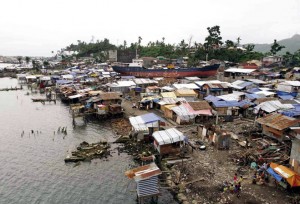MANILA, Philippines – Six months after Supertyphoon ‘‘Yolanda’’ (international name Haiyan) tore through the central Philippines, signs of recovery have started to emerge, according to a report by Unicef Philippines.
Lotta Sylwander, Representative, Unicef (United Nations International Children’s Emergency Fund) Philippines, said Unicef has brought children back to school, reached the most vulnerable with life-saving vaccinations and provided one million people with safe water.
“With 14 million people affected, 5.9 million of whom were children, and four million people losing their homes, the task of helping to re-build the lives of those who survived is daunting”, Sylwander said.
In the aftermath of the typhoon, Unicef immediately deployed experts and resources to prevent the spread of disease and malnutrition and to help children and their families to cope with their losses.
“The aftermath of a disaster such as Yolanda can exacerbate the already devastating impact it had on children and families and this is why Unicef worked with partners to quickly step up its efforts on the ground,” added Sylwander.
“We helped to immunize more than 80,000 children, provide a million people with access to safe water, reached 25,000 children with support to help them overcome the traumas they faced, brought children back to school within the shortest possible time and provided 470,000 children with learning materials.”
Highlights of Unicef’s humanitarian assistance to date are as follows:
Water, Sanitation and Hygiene (WASH)
Unicef helped to restore water sources and provide access to safe water to more than a million people through distribution of water kits, water treatment products, bladders, water storage containers and repair of community water systems.
Unicef helped to provide nearly 100,000 people with access to latrines. To prevent the spread of childhood illnesses including diarrhea Unicef and partners delivered hygiene supplies to more than 450,000 children in schools.
Education
Unicef and partners reached 470,000 preschool and school-aged children with learning supplies and materials in the affected areas. Some 135,000 children benefitted from 1,351 Unicef-supported ‘temporary learning spaces’ equipped with school-in-a-box kits, and recreational and early childhood and development materials. Some 900 education service providers were trained on emergency-related subjects including disaster risk reduction and continuing education during emergencies.
Health
Over 83,000 children under five years of age in the most at-risk areas were vaccinated against measles, focusing on the most at-risk areas. Unicef helped to restore the cold chain, often broken during emergencies. A total of 82 solar-powered refrigerators were distributed to health centres in the affected areas, which is a climate-smart intervention to avoid disruptions in case of power outages. In Tacloban, Unicef is supporting the de-salination plant at the devastated local hospital.
Child Protection
Unicef and partners established 128 child-friendly spaces (CFS), benefitting more than 25,000 children in typhoon-affected regions. Children in these CFS have an opportunity to engage in activities – play, recreation or informal learning – that promote their psychological and social recovery. Teachers were trained to support children in classroom environments, and over 5,000 social workers and caregivers were trained on psychosocial support for children, and prevention and tracking of violence, exploitation, abuse and trafficking.
Nutrition
Unicef and its partners have screened over 240,000 children for malnutrition across three affected regions. A total of 531 children with severe acute malnutrition were admitted to therapeutic feeding programs. In addition, 54 mother-child friendly spaces are serving about 11,000 pregnant and lactating women every month. These spaces counsel women on breastfeeding and complementary feeding.
Unconditional Cash Transfer
Unicef, in partnership with Action Contre La Faim (ACF), offers monthly Unconditional Cash Transfers (UCT) of Php 4,370 or US$100 to 10,000 of the most vulnerable households over a six month period. The UCT helps families buy food and essential non-food items and access health care and services in order to meet the most immediate needs. Some families use the money to invest in livestock and farming, initiating a more long term recovery.
The vulnerability criteria for selection include families with children with disabilities, illnesses, elderly and orphans or malnourished children; pregnant and lactating women; and female headed and child headed households.
Donors answered Unicef’s calls with great generosity, providing critical funding that will stretch until November 2014.
“In spite of Unicef’s continued, intense response since Typhoon Yolanda hit six months ago, and clear progress being made, the work is far from complete,” said Sylwander.
